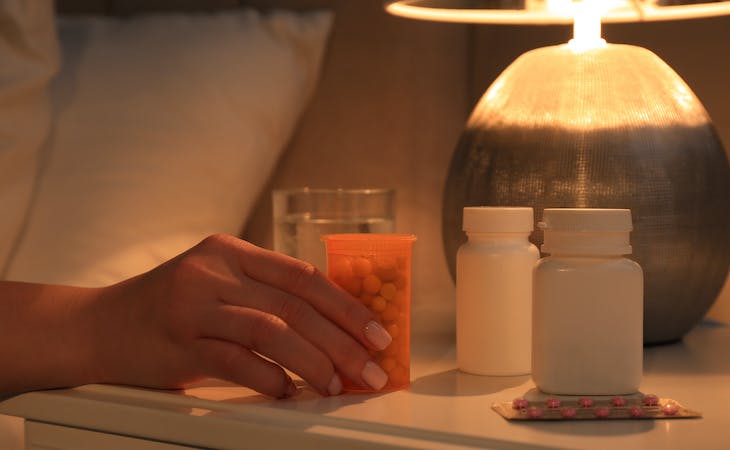If you struggle to get eight hours of quality sleep each night, you’re not alone. About one in three American adults doesn’t get enough sleep.
Maybe you have a friend who swears by melatonin to sleep through the night. Or perhaps your partner raves about the calming effects of CBD.
But do over-the-counter sleep aids really work? We asked a sleep doctor to discuss popular OTC sleep aids and what science says about their safety and effectiveness.
What are the most common OTC sleep aids?
Most OTC sleep aids include one or more of the following ingredients:
Melatonin
“Melatonin is a hormone produced by the pineal gland that helps regulate the sleep-wake cycle,” explains Stephanie Stahl, MD, sleep medicine physician and assistant professor at Indiana University Health.
Your body already creates melatonin to help you fall asleep on time, but exposure to evening light can block production.
Research suggests that taking a melatonin dietary supplement can relieve that circadian rhythm disruption. Thus, a melatonin supplement might be worth a try if you work the night shift or have jet lag.
Common melatonin supplements include:
- Nature’s Bounty Melatonin
- Nutra Champs Melatonin Gummies
- Natrol Melatonin Liquid Sleep Support
Diphenhydramine and doxylamine
Diphenhydramine and doxylamine are both antihistamines, a type of allergy medication. But these OTC medications also affect the nervous system, making you feel sleepy, according to Stahl.
Because antihistamines influence more than just sleep, you should only take diphenhydramine and doxylamine if you’re also down with a cold, flu, or allergies.
You can find diphenhydramine and doxylamine in many OTC sleep aids, including:
- Advil PM
- Benadryl
- Tylenol Cold and Cough Nighttime
- Vicks NyQuil Cough
Valerian
While people have used the herb valerian as an OTC sleep aid for centuries, scientists are still on the fence about its effectiveness.
Stahl says valerian is thought to boost the neurotransmitter GABA, which helps reduce stress and encourage sleep. As such, valerian might be a helpful sleep aid if stress or anxiety keeps you up at night.
You can find valerian in a variety of OTC sleep products, including:
- Valerian Essential Oil (caution: for aromatherapy, not ingestion)
- Buddha Teas Valerian Root Tea
- Garden of Life, MyKind Organics, Sleep Well vegan tablets
CBD
CBD (aka cannabidiol) is a non-psychoactive compound in cannabis.
Scientists are still investigating exactly how CBD affects sleep. What they know is that CBD influences your body’s endocannabinoid system, which plays a role in your sleep-wake cycle.
Though anecdotal evidence abounds for this popular sleep aid, a 2022 research review concluded that CBD has a minimal effect on sleep disorders—and can even negatively affect some people.
Bottom line: It’s hard to say whether CBD will help you fall asleep faster or sleep more deeply. It’s best to consult your doctor before trying CBD oil, gummies, or tinctures.
Do OTC sleep aids work?
“For most people, OTC sleep aids are not significantly effective,” explains Stahl. The exception, she says, may be melatonin.
The scientific consensus is that controlled-release melatonin is the only OTC sleep aid recommended for adults who struggle to fall asleep. Though melatonin might help you get a disrupted sleep schedule back on track, Stahl emphasizes that it’s not a proven solution for chronic insomnia.
If you have chronic insomnia or fall asleep easily but struggle to stay asleep, even melatonin might not help. Chronic sleep problems call for a consultation with a medical professional.
Are OTC sleep aids safe?
“Just because something is available OTC without a prescription or reported as ‘natural’ does not mean that it’s safe or safer,” Stahl warns.
Always check with a medical professional before adding any new medication or supplement to your routine, sleep aids included.
Even OTC medications can cause adverse side effects such as headaches, dizziness, or nausea. Sleep aids could also interact with other medicines you’re taking.
Finally, while sleep aids like melatonin and CBD are considered generally safe for most people, they’re not approved by the Food and Drug Administration (FDA). This means it can be challenging to ensure product quality.
FAQs
What is the best over-the-counter sleep aid?
Of all the over-the-counter sleep aids, melatonin has the most scientific backing. But since melatonin isn’t FDA-approved, product quality varies. Your best bet is to discuss your sleep problems with a medical professional and follow their guidance.
Is there an OTC equivalent to Ambien?
No OTC sleep aid matches the power of Ambien, which is a prescription-strength sedative used to treat insomnia.
Do over-the-counter sleep aids work?
Whether an OTC sleep aid works depends on the cause of your sleeplessness and the quality and effectiveness of the product’s ingredients.
“Just because something is advertised as a sleep aid does not mean that there’s data to support it being beneficial for the majority of people,” says Stahl.
The bottom line on OTC sleep aids
OTC sleep aids may help you manage short-term sleep problems like jet lag or sleeplessness due to anxiety or stress. However, they can also cause side effects and interactions with other medications.
It’s also important to understand that sleep aids are not meant to be taken all the time. Using them for longer than recommended could indicate an underlying health issue.
Talk to your doctor if you’re interested in trying an OTC medication for sleep. A medical professional can help pinpoint the cause of your sleeplessness and guide you toward a safe, effective solution.
Certain herbs and plants have medicinal properties that may aid in sleep. Check out our roundup of the best herbs for sleep.




